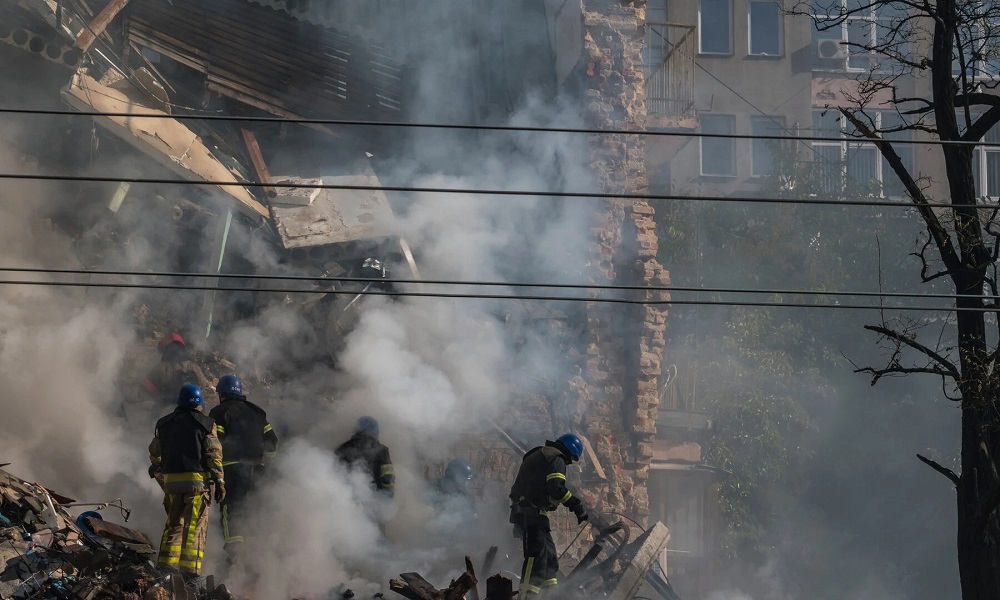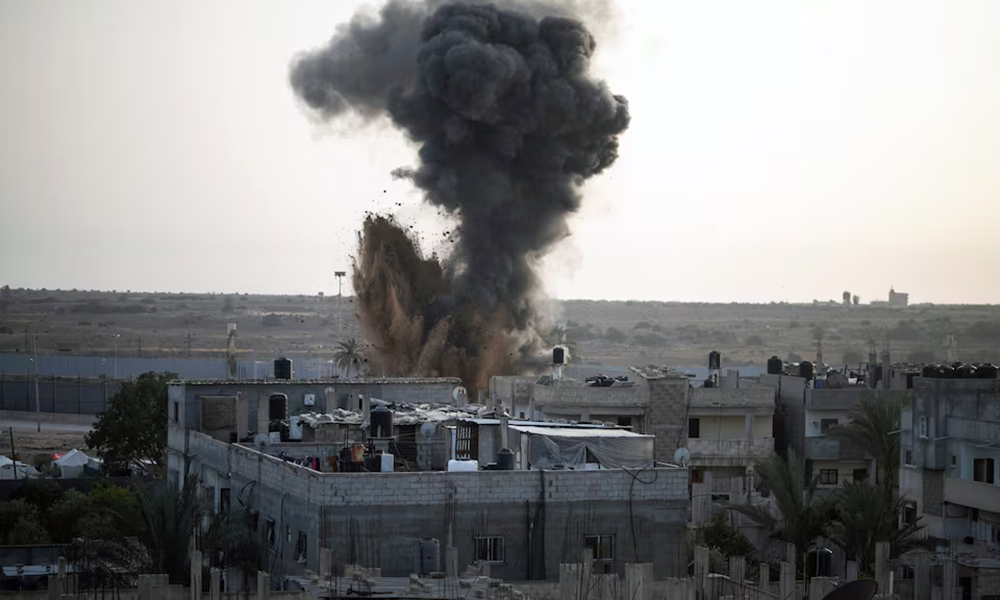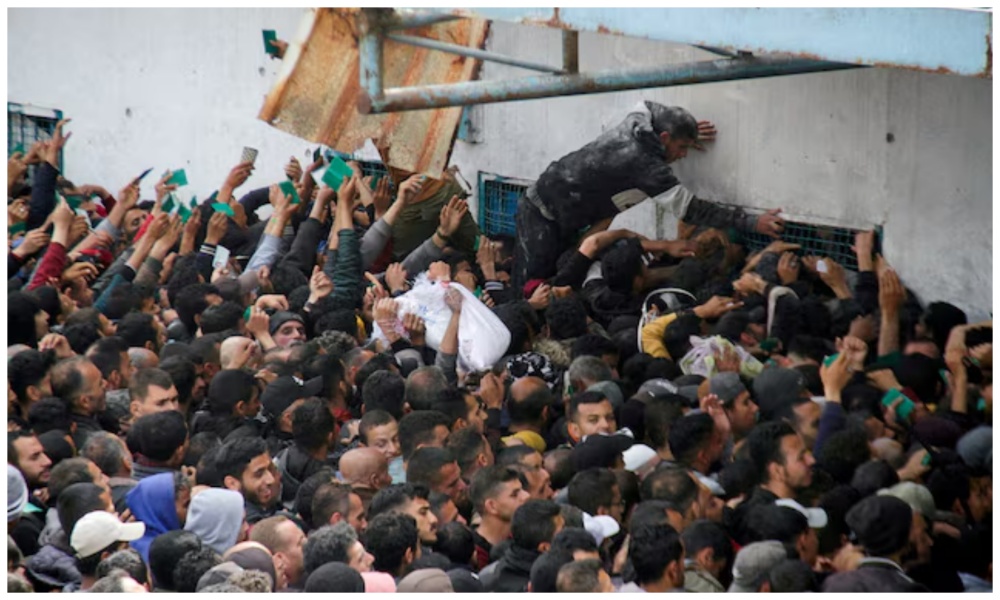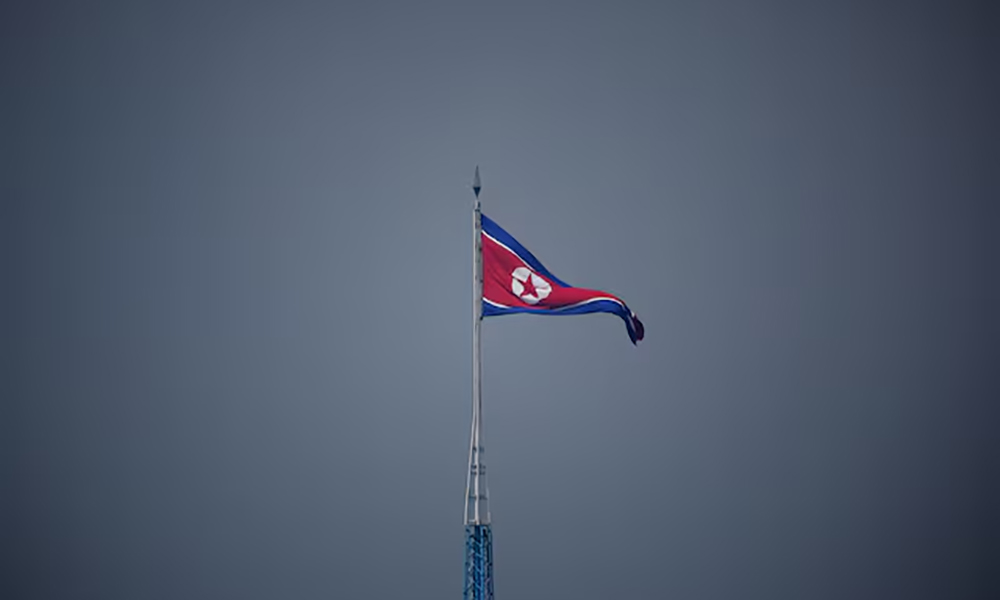World
Russia hits infrastructure targets across Ukraine, targets power and water

Russian missiles crashed into infrastructure targets across Ukraine on Tuesday morning as Moscow stepped up what looked like a deliberate campaign to destroy electricity and water facilities before winter, Reuters reported.
The major of Zhytomyr, a city of 263,000 people, said the attacks had knocked out the power and water supply, and two explosions rocked an energy facility in the southeastern city of Dnipro, a city of nearly 1 million, causing serious damage, according to Kyrylo Tymoshenko, a Ukrainian presidential aide.
In the southern Ukrainian port of Mykolaiv, a missile slammed into an apartment building killing at least one man, a Reuters witness said, and blasts were heard and smoke seen rising in Kyiv, the capital.
There were also reports of power facilities being targeted in the city of Kharkiv, a city with a pre-war population of 1.43 million people, close to the Russian border.
Ukrainian President Volodymyr Zelenskiy accused Russia of terrorising and killing civilians with the air attacks, which came a day after drone strikes on Kyiv and other cities killed at least four people.
“Ukraine is under fire by the occupiers. They continue to do what they do best – terrorise and kill civilians,” Zelenskiy wrote on the Telegram messaging app.
“The terrorist state will not change anything for itself with such actions. It will only confirm its destructive and murderous essence, for which it will certainly be held to account.”
There was no immediate word on how many people had been killed in the strikes.
Russia earlier this month named General Sergei Suvorikin as overall commander of what Moscow calls its “special operation” in Ukraine. Suvorikin served in Syria and Chechnya where Russian forces pounded cities in a scorched earth policy against its foes.
Nicknamed “General Armageddon” by the Russian media because of his alleged toughness, his appointment was followed by the biggest wave of missile strikes against Ukraine since Moscow invaded on Feb. 24.
Russia carried out its latest strikes on Tuesday after the United States warned it would hold Moscow accountable for any war crimes.
Moscow denies targeting civilians. Its defence ministry has said it is carrying out attacks on military targets and energy infrastructure across Ukraine using high-precision weapons.
In the port city of Mykolaiv, a Reuters witness said they had heard three explosions in the early hours of Tuesday.
A missile had completely destroyed one wing of a building in the downtown area, leaving a massive crater, they said. A fire crew was seen pulling the dead body of a man from the rubble.
The Russian strikes followed advances by Ukrainian forces in the east and south and came after an Oct. 8 blast on a bridge linking mainland Russia to Crimea – the peninsula Russia annexed from Ukraine in 2014.
U.S. President Joe Biden’s press secretary Karine Jean-Pierre told reporters on Monday that the White House “strongly condemns Russia’s missile strikes” and spoke of Putin’s “brutality”.
World
Israel says it is poised to move on Rafah

Israel’s military is poised to evacuate Palestinian civilians from Rafah and assault Hamas hold-outs in the southern Gaza Strip city, a senior Israeli defence official said on Wednesday, despite international warnings of a humanitarian catastrophe, Reuters reported.
A spokesperson for Prime Minister Benjamin Netanyahu’s government said Israel was “moving ahead” with a ground operation, but gave no timeline.
The defence official said Israel’s Defence Ministry had bought 40,000 tents, each with the capacity for 10 to 12 people, to house Palestinians relocated from Rafah in advance of an assault.
Video circulating online appeared to show rows of square white tents going up in Khan Younis, a city some 5 km (3 miles) from Rafah. Reuters could not verify the video but reviewed images from satellite company Maxar Technologies which showed tent camps on Khan Younis land that had been vacant weeks ago.
An Israeli government source said Netanyahu’s war cabinet planned to meet in the coming two weeks to authorise civilian evacuations, expected to take around a month, read the report.
The defence official, who requested anonymity, told Reuters that the military could go into action immediately but was awaiting a green light from Netanyahu.
Rafah, which abuts the Egyptian border, is sheltering more than a million Palestinians who fled the half-year-old Israeli offensive through the rest of Gaza and say the prospect of fleeing yet again is terrifying.
“I have to make a decision whether to leave Rafah because my mother and I are afraid an invasion could happen suddenly and we won’t get time to escape,” said Aya, 30, who has been living temporarily in the city with her family in a school.
She said that some families recently moved to a refugee camp in coastal Al-Mawasi, but their tents caught fire when tank shells landed nearby. “Where do we go?”
HITTING HARD
Israel, which launched its war to annihilate Hamas after the Islamist group’s Oct. 7 attacks on Israeli towns, says Rafah is home to four Hamas combat battalions reinforced by thousands of retreating fighters, and it must defeat them to achieve victory.
“Hamas was hit hard in the northern sector. It was also hit hard in the centre of the Strip. And soon it will be hit hard in Rafah, too,” Brigadier-General Itzik Cohen, commander of Israel’s 162nd Division operating in Gaza, told Kan public TV.
But Israel’s closest ally Washington has called on it to set aside plans for an assault, and says Israel can combat Hamas fighters there by other means.
“We could not support a Rafah ground operation without an appropriate, credible, executable humanitarian plan precisely because of the complications for delivery of assistance,” David Satterfield, U.S. special envoy for Middle East humanitarian issued, told reporters on Tuesday.
“We continue discussions with Israel on what we believe are alternate ways of addressing a challenge which we recognise, which is Hamas military present in Rafah.”
Egypt says it will not allow Gazans to be pushed across the border onto its territory. Cairo had warned Israel against moving on Rafah, which “would lead to massive human massacres, losses (and) widespread destruction”, its State Information Service said.
Three Egyptian security sources said that military and security coordination between Egypt and Israel over any Israeli incursion into Rafah did not mean approval of it, Reuters reported.
Egypt welcomed the return of Palestinians northwards from Rafah, believing it to be in the interest of the population despite also serving Israeli plans to besiege Hamas in Rafah, the sources added.
Israel has withdrawn most of its ground troops from southern Gaza this month but kept up air strikes and conducted raids into areas its troops abandoned. Efforts by the United States, Egypt and Qatar to broker an extended ceasefire in time to head off an assault on Rafah have so far failed.
Gaza medical officials say than 34,000 people have been killed in Israel’s military campaign, with thousands more bodies feared buried under rubble.
Hamas killed 1,200 people and abducted 253 on Oct 7, according to Israeli tallies. Of those hostages, 129 remain in Gaza, Israeli officials say. More than 260 Israeli troops have been killed in ground fighting since Oct 20, the military says.
H. A. Hellyer, a senior associate fellow in international security studies at the Royal United Services Institute, said he expected the assault on Rafah “sooner rather than later” because Netanyahu is under pressure to meet his stated objectives of rescuing hostages and killing all the Hamas leaders.
“The invasion of Rafah is unavoidable because of the way he has framed all of this,” he said. But it will not be possible for everyone to leave the city, so “if he sends the military into Rafah, there are going to be a lot of casualties”.
World
Famine risk ‘very high’ in Gaza, especially in north, US official says

Israel has taken significant steps in recent weeks on allowing aid into Gaza, the U.S. special envoy for humanitarian issues said on Tuesday, but considerable work remained to be done as the risk of famine in the enclave is very high.
David Satterfield declined to say whether Washington was satisfied by Israel’s moves, weeks after U.S. President Joe Biden demanded action to alleviate the humanitarian crisis in Gaza, saying conditions could be placed on U.S. support for close ally Israel if it did not implement a series of “specific, concrete and measurable” steps.
“Israel has taken significant steps in these last two and a half weeks,” Satterfield told reporters.
“There is still considerable work to be done. But progress has been made.”
The risk of famine throughout war-devastated Gaza, especially in the north, is “very high”, he said, calling for more to be done to get aid to those in need in that part of the tiny, densely populated Palestinian territory, Reuters reported.
The United Nations has long complained of obstacles to getting aid in and distributing it throughout Gaza in the six months since Israel began an aerial and ground offensive against Gaza’s ruling Islamist militant group Hamas.
Israel’s military campaign has reduced much of the territory of 2.3 million people to a wasteland with an unfolding humanitarian disaster since October, when Hamas ignited war by storming into southern Israel.
The head of the U.N. Palestinian refugee agency (UNRWA), Philippe Lazzarini, said on Tuesday that the daily average number of trucks entering Gaza during April was 200 and that there had been a peak on Monday of 316.
There was also now a focus on garbage collection, he added, especially in southern Gaza, in a bid to avoid disease outbreaks as the warmer weather approaches.
World
North Korea officials visit Iran in a rare public trip

A North Korean delegation led by the cabinet minister for international trade is visiting Iran, the North’s official media said on Wednesday in a rare public report of an exchange between the two countries believed to have secret military ties, Reuters reported.
The minister for external economic relations, Yun Jong Ho, left Pyongyang on Tuesday by air leading a ministry delegation to visit Iran, the North’s KCNA news agency said. It gave no other detail.
North Korea and Iran have long been suspected of cooperating on ballistic missile programmes, possibly exchanging technical expertise and components that went into their manufacture, read the report.
Iran has provided a large number of ballistic missiles to Russia for use in its war with Ukraine, Reuters reported in February.
North Korea is also suspected of supplying Russia with missiles and artillery, although both countries have denied the allegation.
Yun has previously worked on the country’s ties with Syria, according to South Korean government database.
Yun has been active in the country’s increasing exchanges with Russia, earlier this month leading a delegation to visit Moscow, according to KCNA.
-

 Latest News4 days ago
Latest News4 days agoPakistan’s frontiers minister stresses ‘dignified’ return of Afghan refugees
-

 Regional3 days ago
Regional3 days agoIranian president lands in Pakistan for three-day visit to mend ties
-

 Climate Change4 days ago
Climate Change4 days agoMassive river flooding expected in China, threatening millions
-

 Latest News4 days ago
Latest News4 days agoChinese keen to invest in Panjshir-Kabul water conduit project
-

 Latest News2 days ago
Latest News2 days agoRashid Khan named AWCC’s brand ambassador
-

 World4 days ago
World4 days agoTwo Japan navy helicopters crash, one body found, 7 missing
-

 Sport3 days ago
Sport3 days agoKolkata beat Bengaluru by one run in IPL as Kohli fumes at dismissal
-

 Sport3 days ago
Sport3 days agoACL: Aino Mina 3-0 Istiqlal Kabul; Attack Energy 3-0 Khadim
























